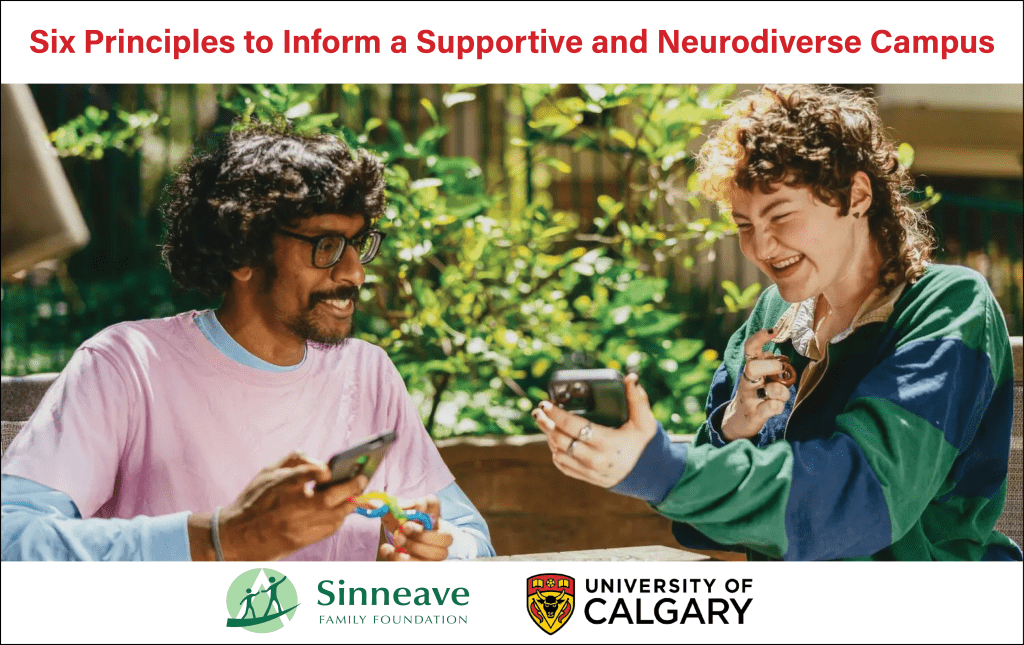One of our favourite things is going out into the community to share the work we’re doing.
Sinneave’s vision is that autistic youth and adults would have access to the tools and resources they need to succeed in school, in work and in life. A big part of that is ensuring that the people who are running schools, hiring in workplaces, and providing housing to the community know how they can contribute to making that vision a reality.
So, in collaboration with a team of autistic self-advocates, we developed Six Principles for Inclusion to inspire greater understanding, acceptance and valuing of autism and neurodiversity. Each of the Six Principles directly informs ally-based actions that create and foster environments where everyone can thrive at:
- Building relationships
- Enhancing communication through collaboration
- Identifying and implementing proactive strategies for inclusion.
Over the past year, we have been sending teams out into the community to share the Six Principles. We encourage the organizations we meet with to build their understanding of autism and neurodiversity, and we empower them to take action towards creating inclusive schools and workplaces.
While our aim through these presentations is to increase general understanding of autism and neurodiversity, these principles are broadly applicable to all types of organizations and can enhance learning, work and living environments for everyone, not just autistics.
We had the pleasure of presenting these Six Principles to a receptive online audience at UCalgary recently and Vanessa Kozielec, for the Campus Mental Health Strategy, wrote about it in the university’s UToday weekly newsletter on January 16, 2024. In “6 Principles to inform a supportive and neurodiverse campus,” she writes:
“A recent UCalgary study indicates that 17 per cent of its student population is considered neurodivergent, a term encompassing those with autism, attention deficit hyperactivity disorder (ADHD), obsessive-compulsive disorder (OCD), dyslexia, anxiety disorders, Tourette’s syndrome and more.
Many neurodivergent individuals face challenges in the education system. A study by Statistics Canada investigated the independent role neurodivergence plays in post-secondary enrolment rates of youth aged 18 to 22, compared to their non-neurodivergent peers.
Findings suggest that only 48 per cent of youth diagnosed with neurodivergence enrolled in post-secondary. Youth diagnosed with both neurodivergence and a mental health condition were even less likely to enroll: only 36 per cent went on to post-secondary.”
We know that once in post-secondary, many autistic and neurodivergent students struggle to succeed due to a lack of support for the way they learn and process information, and a lack of flexibility in the way these institutions are structured.
By taking into consideration the Six Principles for Inclusion and implementing easy-to-apply strategies for fostering inclusivity on campuses, it can make a huge difference for these students.
You can read the full UToday article by clicking HERE. The university has also posted a video of our presentation on its Youtube channel that you can view HERE, if you want to see what it’s all about.
Even better, we invite you to book your own discussion/presentation. There is no charge for this service and we will tailor the content to your specific audience as well as the preferred format and time—such as a one-hour “Lunch and Learn” or a full 90-minute discussion—offered virtually or in-person (in the Calgary area).
To learn more about our Six Principles for Inclusion and to book your own discussion, you can visit our website HERE, or reach out directly to info@sinneavefoundation.org.


